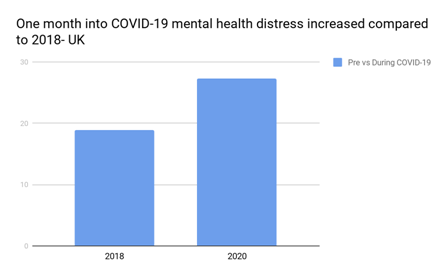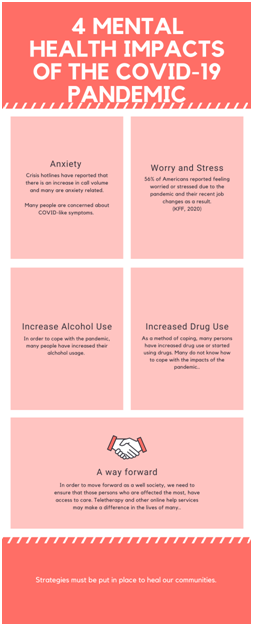Pandemic and the Increase in Mental Health problems

Stress management therapy, family counseling service, anxiety counselors
Since the onset of COVID-19, many people have reported a decrease in overall wellbeing. This decrease is actual for people worldwide; however, independent studies have been conducted within the US and the UK, which show an increase in stress and worry. For this, it’s clear that appropriate stress management therapy or family counseling service is needed to aid in relief. It becomes clear that the 2020 pandemic has caused an increase in mental health problems. Let’s dive a bit deeper.
Worry and Stress
Following the beginning of lockdown in March of 2020, many have been curious about how people are handling themselves and this newfound reality. A study conducted by the Kaiser Family Foundation reported that almost all survey respondents (102%) were affected by job losses, while 42% also had spouses who lost their job. This result is related to an increase in mental health problems, as many studies have reported that unemployment vastly affects mental health. A prior study said that “Mental health was shown to be both a consequence of and risk factor for unemployment” (Olesen et al., 2013). This reference is to say that job loss caused an increase in mental health problems while, mental health problems made it all the more difficult to get a job.
On a more specific note, the Kaiser Family Foundation’s study reported that 56% of Americans indicated that the worry and stress caused as a direct result of the COVID-19 pandemic had impacted their mental health and wellbeing. A few of the impacts include difficulty eating, problems with sleep, increased alcohol intake, and issues with other chronic conditions. But, everyday Americans are not the only ones affected. Frontline and health care works have also faced impacts

On the UK front, a study reported that the prevalence of mental health distress has significantly increased from 18.9% in 2018 to 27.3% in April of 2020, only one month into lockdown. This shows that on different continents, people are being plagued with not only the pandemic of COVID-19 but a possible mental health crisis as well.

Anxiety
The constant information releases regarding the virus, and possible confusion of the symptoms may have led to increases in anxiety-related behaviors and disorders. A paper by the LA Times reported that crisis hotlines had seen an increase in calls, and many seem to be anxiety-related. People are worried about COVID-like symptoms, their family members, and many aspects of present-day living.
This has also impacted the crisis counselors who are not anxiety counselors specifically but more trained laypersons who can deal with specific issues. So, it seems a unique situation where both counselors and callers are affected by the same fear and anxiety.
Alcohol and Drug Misuse
Many have taken up alcohol and drugs or have increased their use as a response to the current conditions. With this, a study by the Well Being Trust predicted that there would be increases to 75,000 deaths due to despair. This will stem from alcohol and drug misuse, as well as suicide.
Significant job loss, uncertainty, and mandatory social isolation are the main culprits of this increase in despair.
To that end, it remains true that something must be done if we are to avoid further death and disruption following the pandemic.

A Way Forward
It seems that the best way forward involves increasing efforts of providing psychological care. Many are pushing for increases in teletherapy and the possibility of educating lay people on specific strategies.
Since the pandemic, it has been noted that online counseling services and help-lines have seen a significant increase in call volume. Thus, it seems right that more of these organizations may need to be created and funded to help deal with the rise in the need for service.
If we are to move forward, as a mentally well society, more needs to be done for first responders and the wider community. And, these efforts must be in a sustainable way.
Summary
With the pandemic’s significant impacts, the focus has to shift to aiding relief, and now more than ever, it seems that people need guidance on how to cope during such times. One thing that has been proven useful is online mental health services; this includes but is not limited to Stress management therapy, and some form of family counseling service. It may also help get trained anxiety counselors who can help persons work through specific situations. With this, individuals and families will have a way to process and handle the blowbacks of job loss, increased homeschooling, delayed bills, desire, grief, and many other pressing issues.
Sources used:
https://www.ncbi.nlm.nih.gov/pmc/articles/PMC3681556/
https://www.thelancet.com/journals/lanpsy/article/PIIS2215-0366(20)30308-4/fulltext
